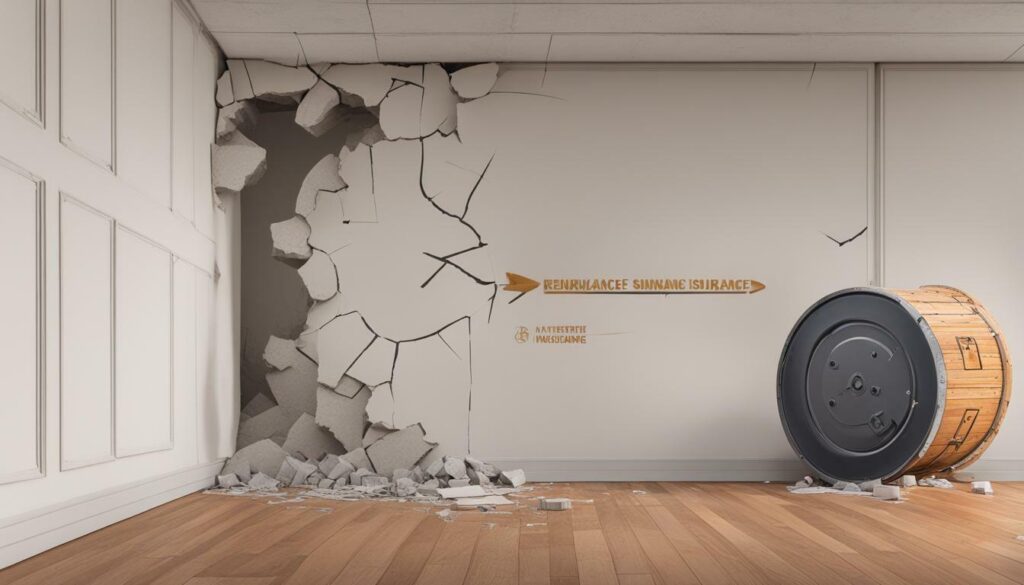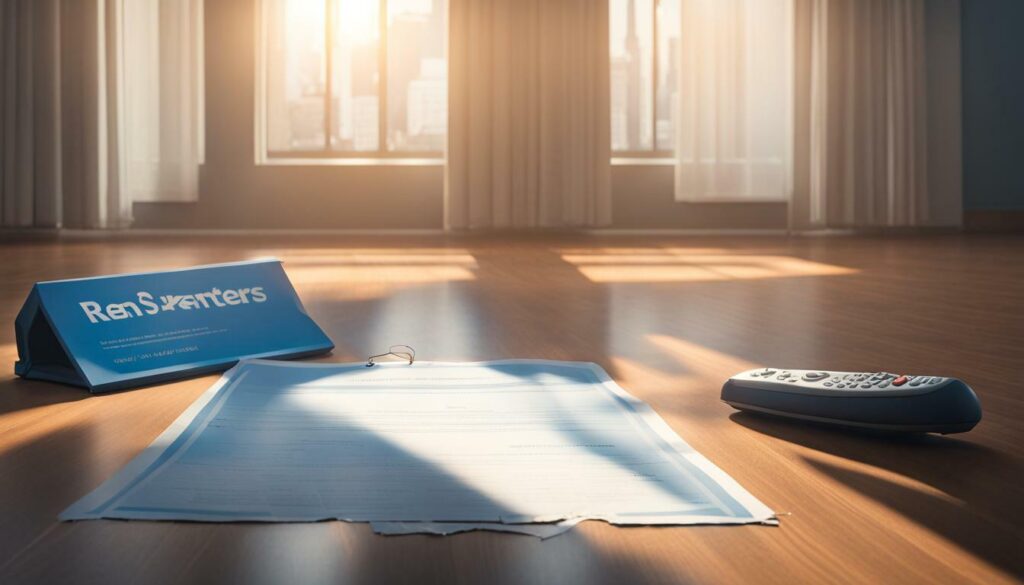Living in an apartment can be an exciting and convenient experience, but it’s important to consider the safety of your personal belongings. Your landlord’s insurance policy likely only covers the building structure and not the contents of your apartment. So, what type of insurance covers the contents of an apartment? The answer is renters insurance, also known as apartment insurance or contents insurance.
Renters insurance provides personal property coverage, which means it protects your belongings in case of theft, damage, or destruction due to a covered event such as a fire or natural disaster. With apartment belongings coverage, you can have peace of mind knowing that your items are protected from unexpected events.
So, do you need renters insurance? The answer is yes, it is highly recommended for anyone who is renting an apartment or rental property. Let’s explore why.
Key Takeaways:
- Renters insurance is the type of insurance that covers the contents of an apartment.
- It provides personal property coverage and protects your items from theft, damage, or destruction due to covered events.
- Renters insurance is highly recommended for anyone who is renting an apartment or rental property.
Why Do You Need Insurance for the Contents of Your Apartment?
If you are renting an apartment, you may think that your landlord’s insurance policy will cover the loss or damage of your personal belongings. However, this is not the case. Landlord’s insurance only covers the building and the common areas of the apartment complex, not your personal property.
This is where apartment insurance, also known as renters insurance, comes in. It provides protection for your personal belongings in case of theft, fire, or other covered events. Without apartment insurance, you may be left with no way to replace your lost or damaged belongings.
Personal property coverage is included in most renters insurance policies, which means that your possessions, such as furniture, electronics, and clothing, are covered up to a certain limit. Additionally, renters insurance usually includes liability coverage, which can protect you if someone is injured in your apartment or if you accidentally damage someone else’s property.
Apartment insurance is a wise investment for anyone renting an apartment and wanting to protect their personal belongings. With the peace of mind that comes with knowing your belongings are covered, you can focus on enjoying your new home without worrying about potential losses.
So, if you are renting an apartment, consider getting renters insurance or apartment insurance to protect your personal property. It’s a small price to pay compared to the potential cost of replacing everything you own.


What Does Contents Insurance Cover?
If you are renting an apartment, it is important to protect your personal belongings. While most landlords have insurance that covers the building and any fixtures, they typically do not cover your personal property. That is where contents insurance, also known as apartment belongings coverage or insurance for apartment contents, comes in.
Contents insurance is designed to protect your personal property in case it is damaged, destroyed, or stolen. This includes items such as furniture, electronics, clothing, and jewelry.
It is important to note that not all contents insurance policies are the same. Some policies may offer limited coverage for specific items, such as jewelry or collectibles. Others may exclude certain types of damage, such as floods or earthquakes. It is important to read the policy carefully to understand what is and is not covered.
In general, contents insurance covers losses caused by:
- Fire
- Theft
- Vandalism
- Water damage from burst pipes or overflowed appliances
- Windstorms and hail
Additionally, some contents insurance policies may offer optional coverage for:
- Identity theft
- Pet damage
- Loss of use (provides compensation for additional living expenses if you need to temporarily move out of your apartment due to a covered loss)
It is important to note that contents insurance typically has a coverage limit, which is the maximum amount that the insurance company will pay out for a covered loss. Additionally, most policies will have a deductible, which is the amount that you will be responsible for paying before the insurance coverage kicks in.
Overall, contents insurance is a crucial investment for protecting your personal property in your rented apartment. It is important to carefully review the policy and understand what is and is not covered, as well as any optional coverage that may be available.


Understanding Renters Insurance
If you are renting an apartment or a house, you should consider purchasing renters insurance. While your landlord’s insurance will cover the building itself, it will not cover your personal belongings. That’s where renters insurance comes in.
With renters insurance, you can protect your belongings in case they are damaged or stolen. It also provides liability protection in case someone is injured in your apartment.
When you purchase renters insurance, you will be asked to choose between actual cash value coverage and replacement cost coverage. Actual cash value coverage will reimburse you for the current value of your belongings, while replacement cost coverage will reimburse you for the cost of replacing your belongings at current market prices.
It’s important to note that renters insurance does not cover damage to the building itself. That’s the responsibility of the landlord’s insurance.
Renters insurance also typically includes additional living expenses coverage, which pays for temporary housing and other expenses if your apartment becomes uninhabitable due to a covered event, such as a fire or flood.
Overall, renters insurance provides important protection for your personal belongings and liability. Consider purchasing renters insurance to ensure your apartment contents are protected, especially since landlord’s insurance typically does not provide apartment contents protection.


Coverage Limits and Deductibles
When purchasing apartment insurance coverage or apartment content insurance, it’s crucial to understand the coverage limits and deductibles that apply. Coverage limits refer to the maximum amount that an insurance policy will pay out for a covered loss. Deductibles, on the other hand, are the amount of money you must pay out-of-pocket before your insurance coverage kicks in.
The coverage limit and deductible amounts will vary depending on the policy you choose. Generally, higher coverage limits and lower deductibles come with higher premiums, while lower coverage limits and higher deductibles result in lower premiums.
It’s important to carefully consider your personal needs and budget when deciding on coverage limits and deductibles. If you have a significant amount of valuable possessions in your apartment, you may want to opt for a higher coverage limit to ensure you’re fully protected in case of a loss. On the other hand, if you’re looking to save on premiums, choosing a higher deductible can help you do so.
Choosing the Right Coverage Limit
When selecting a coverage limit, take an inventory of all your belongings and estimate their total value. Keep in mind that some items, like jewelry and electronics, may have coverage limits on standard policies. Consider whether you’d like to add additional coverage for these items. You may also want to consider liability insurance, which can cover you in case someone is injured in your apartment.
Once you have an estimate of the value of your belongings, choose a coverage limit that will adequately cover them. It’s important to note that if you underestimate the value of your possessions, you may not receive enough compensation in case of a loss.
Understanding Deductibles
When selecting a deductible, consider how much you’re willing and able to pay out-of-pocket in case of a loss. Higher deductibles can result in lower monthly premiums, but you’ll need to be prepared to pay more out-of-pocket if you need to make a claim. Lower deductibles may have higher premiums, but you’ll have to pay less if you need to make a claim.
Some policies have a separate deductible for certain types of losses, like water damage or theft. Be sure to understand what deductibles apply to your policy and when they apply.
Understanding coverage limits and deductibles is crucial when purchasing apartment insurance coverage or apartment content insurance. By carefully selecting the right coverage limit and deductible for your needs and budget, you can ensure you’re fully protected in case of a loss.


Additional Coverage Options
Your basic apartment insurance policy covers the usual contents of your apartment: furniture, clothing, electronics, and other personal belongings. However, some items might not be fully covered by your policy, and you might need additional coverage options. Here are some additional coverage options you may consider:
| Option | Description |
|---|---|
| Jewelry and Valuables Coverage | If you own expensive jewelry or other valuable items, this coverage can provide protection against loss, theft, or damage. |
| Flood Insurance | Your basic apartment insurance policy may not provide protection against water damage caused by floods. You may need to purchase a separate flood insurance policy. |
| Identity Theft Protection | This coverage can help you recover from identity theft and provide financial protection against loss. |
| Pet Insurance | If you have a pet, this coverage can provide protection against veterinary expenses and liability claims. |
| Earthquake Coverage | If you live in an area prone to earthquakes, this coverage can help protect your personal belongings from the effects of an earthquake. |
Keep in mind that each additional coverage option adds to your monthly premium. Therefore, it’s important to evaluate your needs and budget before adding any additional coverage options to your apartment insurance policy.


Factors Affecting Insurance Cost
When looking for apartment insurance, it’s important to understand the factors that affect the cost of your premium. By knowing this information, you can make informed decisions about your coverage and potentially save money on your policy.
The first and most significant factor that affects insurance cost is the amount of coverage you need. The more coverage you require, the higher your premium will be. Keep in mind that the coverage limits should be realistic, based on the value of the belongings you want to insure.
Another factor is the deductible you choose. A deductible is the amount you pay out of pocket before your insurance policy kicks in. Generally, the higher your deductible, the lower your premium. However, make sure you can afford the deductible if you need to make a claim.
Your location is another factor that can impact the cost of your premium. If you live in an area prone to natural disasters or with a high crime rate, you may pay more for your insurance.
Your credit score can also impact the cost of your insurance. Insurance companies often use credit scores to determine their rates, so having a lower score can result in a higher premium.
Lastly, your history of insurance claims can also affect your premium. If you have a history of making many claims in a short period, your insurance company may view you as a higher risk and charge you more for coverage.
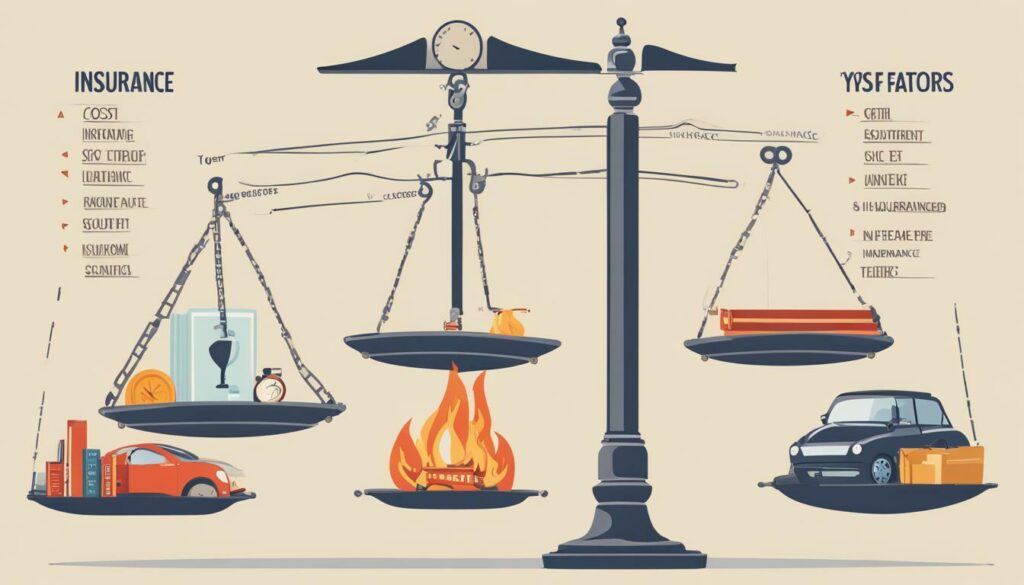

Understanding these factors can help you make informed decisions about your apartment insurance coverage and potentially save money on your premium.
How to Purchase Apartment Insurance
If you’re renting an apartment, having insurance for your personal belongings can provide peace of mind in case of unexpected events. Here’s how you can purchase apartment insurance:
- Shop around for insurance providers that offer apartment insurance coverage. You can check online or ask for recommendations from friends or family.
- Compare insurance policies and assess which coverage options suit your needs. Look at the limits and deductibles to ensure they meet your financial requirements.
- Contact the insurance provider to request a quote. Be prepared to provide information about your apartment, personal property, and any additional coverage options you may need.
- If you’re satisfied with the quote, complete the application process. You may need to provide additional information or documentation to support your application.
- Once your application is approved, make sure to review your policy carefully. Understand what is covered and what isn’t, and clarify any questions or concerns you may have with the insurance provider.
- Pay your insurance premiums regularly to ensure your coverage stays in effect.
Remember, having apartment insurance can help protect your personal property and provide financial assistance in case of unexpected events. Don’t wait until it’s too late, purchase apartment insurance and protect your belongings today.
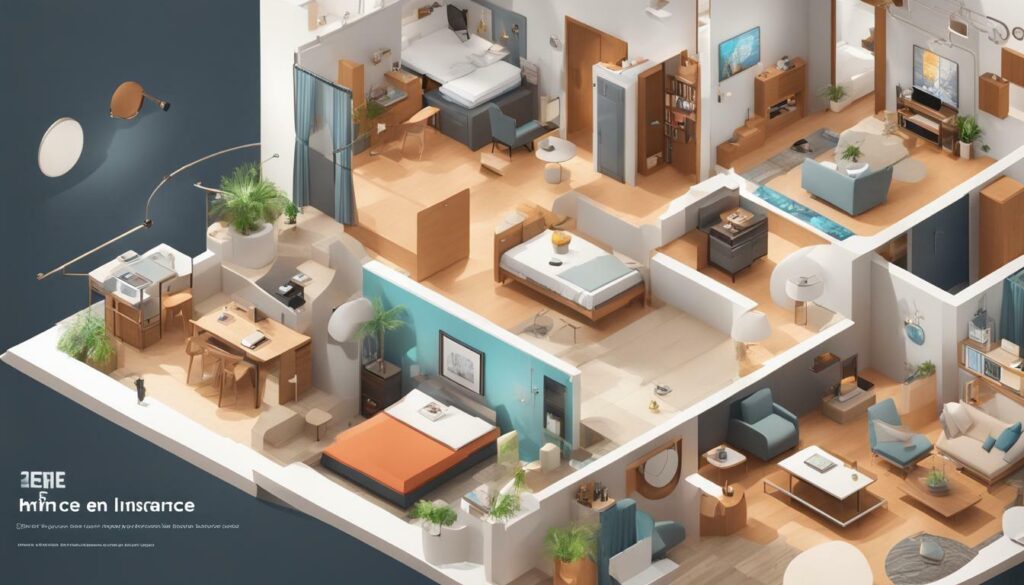

Reviewing and Updating Your Coverage
Once you have purchased apartment insurance, it’s important to regularly review and update your coverage.
Life circumstances can change, and so may the value of your possessions. If you acquire new items or if the value of existing possessions increases, you may need to increase your coverage limits to ensure that you’re adequately protected in the event of loss or damage.
You may also want to review your policy if you make any significant changes to your apartment, such as adding new security measures or making any structural improvements. These changes may make you eligible for discounts or may require adjustments to your coverage.
It’s also a good idea to review your policy annually to ensure that it still meets your needs and provides adequate protection. Consider any life changes that may have occurred over the past year and whether your coverage should be adjusted accordingly.
Make sure to keep an updated inventory of your possessions and their value to assist in the event of a claim. This will also help you determine if you need to adjust your coverage limits.


Remember that it’s always better to have too much coverage than not enough. Take the time to regularly review and update your apartment insurance policy to ensure that you’re fully protected.
Tips for Making a Claim
Hopefully, you will never have to make a claim on your apartment insurance. However, accidents and unexpected events happen. If you do need to make a claim, it’s essential to understand the process to ensure a smooth and successful outcome. Here are some tips for making a claim:
- Report the incident promptly: As soon as you experience a loss or damage to your apartment belongings, you must report it to your insurance company. Most policies have a time limit for reporting incidents, so be sure to act quickly.
- Gather evidence: Collect as much evidence as possible. Take photos or videos of the damage, and create a list of the items affected. Keep receipts, invoices, and any other relevant documents that demonstrate the value of the lost or damaged items.
- Be honest: Be completely honest and accurate when describing the incident to your insurance company. Providing false information can result in a denied claim.
- Keep records: Keep track of all conversations and correspondence with your insurance company, including the dates and times of phone calls and emails.
- Cooperate with your insurer: Your insurance company may require an independent adjuster to assess the damage and confirm the value of the claim. Cooperate with them to ensure that the process goes smoothly.
- Understand your policy: Familiarize yourself with your apartment insurance policy, including the coverage limits and deductibles. Understanding your policy will help you set realistic expectations for the claims process.
Remember, making a claim on your apartment insurance can be stressful, but by following these tips, you can increase your chances of receiving the compensation you deserve.
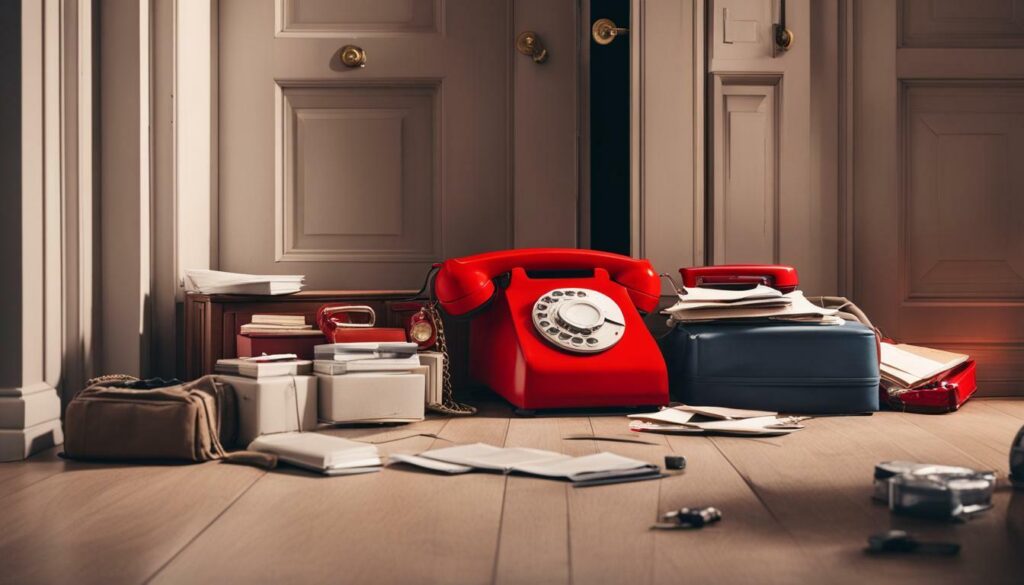

Conclusion
Congratulations! Now you have a better understanding of what type of insurance covers the contents of an apartment, why you need it, and what it covers. Remember, apartment insurance or renters insurance is essential to protect your personal property from unforeseen damages or losses.
When selecting an insurance policy, make sure you understand the coverage limits and deductibles. Also, consider additional coverage options like liability coverage or flood insurance. Keep in mind that various factors affect the cost of your insurance, such as your location, credit score, and the value of your possessions.
When purchasing apartment insurance, take some time to research and compare different policies from different providers. Don’t forget to review and update your coverage regularly to ensure it meets your needs.
Finally, in case of an accident or loss, make sure you know how to make a claim. Follow the instructions carefully and provide all the necessary documentation.
Now, armed with this knowledge, you can confidently secure your apartment contents protection with the right insurance policy. Stay safe and secure!
FAQ
Q: What type of insurance covers the contents of an apartment?
A: Renters insurance or apartment insurance typically covers the contents of an apartment.
Q: Why do you need insurance for the contents of your apartment?
A: Having insurance for the contents of your apartment provides protection for your personal belongings in case of theft, damage, or other covered events.
Q: What does contents insurance cover?
A: Contents insurance typically covers the personal property you have in your apartment, such as furniture, electronics, clothing, and other belongings.
Q: Understanding renters insurance
A: Renters insurance is a type of insurance that provides coverage for tenants’ personal belongings and liability protection in case someone is injured in your apartment.
Q: Coverage limits and deductibles
A: Your apartment insurance coverage will have specific limits on how much it will pay out for certain types of items or events. Deductibles are the amount you must pay before your insurance coverage kicks in.
Q: Additional coverage options
A: There may be additional coverage options available for specific items, such as high-value jewelry or collectibles, that require additional protection beyond the standard coverage.
Q: Factors affecting insurance cost
A: Several factors can affect the cost of apartment insurance, including the location of your apartment, the value of your belongings, and your claims history.
Q: How to purchase apartment insurance
A: You can typically purchase apartment insurance through insurance providers. It’s recommended to compare quotes and coverage options to find the best policy for your needs.
Q: Reviewing and updating your coverage
A: It’s important to periodically review your apartment insurance coverage to ensure it still meets your needs. You may need to update your coverage if you acquire new belongings or make changes to your living situation.
Q: Tips for making a claim
A: If you need to make a claim on your apartment insurance, it’s important to document the damage or loss, contact your insurance provider promptly, and provide any necessary documentation to support your claim.


